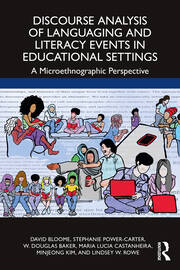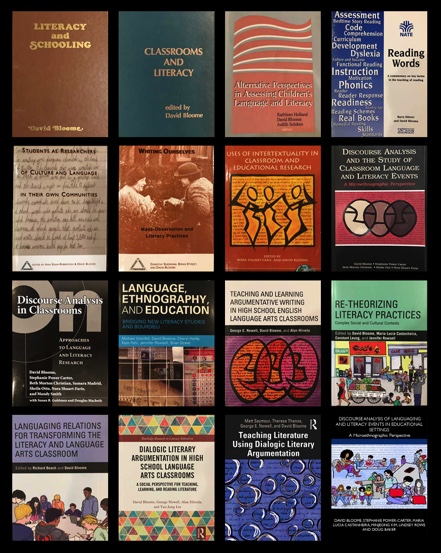CDAVE welcomes Discourse Analysis Scholars to share recent publications.
Recent Publications
Foundational Texts for Discourse Analysis in Education Research & Readings addressing discourse analysis in educational contexts
The items listed below include classic articles, foundational articles, thought-provoking articles addressing contemporary educational issues, and cutting-edge theoretical and empirical articles. We have not included books or book chapters in this list unless an electronic copy is available to the general public.
- Blackburn, M. V. & Clark, C. T. (2011). Analyzing talk in a long-term literature discussion group: Ways of operating within LGBT-inclusive and queer discourses. Reading Research Quarterly, 46(3), 222-248.
- Bloome, D., Beierle, M., Grigorenko, M., & Goldman, S. (2009). Learning Over Time: Uses of Intercontextuality, Collective Memories, and Classroom Chronotopes in the Construction of Learning Opportunities in a Ninth Grade Language Arts Classroom. Language and Education, 23, 4, 313 — 334.
- Bloome, D., Carter, S., Christian, B., Otto, S., & Shuart-Faris, N. (2005). Discourse analysis & the study of classroom language & literacy events : a microethnographic perspective. Mahwah, N.J.: L. Erlbaum Associates.
- Bloome, D, and Egan-Robertson, A. (1993). The social construction of intertextuality and classroom reading and writing. Reading Research Quarterly, 28, 4, 303-333.
- Bernstein, B. (1990). The structuring of pedagogic discourse. London: Routledge.
- Bucholz, M. (2000). The politics of transcription. Journal of Pragmatics 32 (10), 1439-1465.
- Cazden, C. (2002). Classroom discourse: The language of teaching and learning. (2nd edition) Portsmouth, NH: Heinemann.
- Cazden, C, John, V., & Hymes, D. (eds.) (1972). Functions of language in the classroom. New York: Teachers College Press.
- Christie, F. (2002). Classroom Discourse Analysis: A functional Perspective. New York: Continuum.
- Egan-Robertson, A. (1998). Learning about culture, language, and power: Understanding relationships among personhood, literacy practices, and intertextuality. Journal of Literacy Research, 30, 449-487.
- Erickson, F., & Shultz, J. (1977). When is a context? Newsletter of the Laboratory for Comparative Human Cognition, 1, 2, 5-12.
- Green, J. (1983). Exploring classroom discourse: Linguistic perspectives on teaching-learning processes. Educational Psychologist, 18, 3, 180-199.
- Green, J., & Wallat, C. (eds). (1981). Ethnography and language in educational settings. Norwood, NJ: Ablex Publishing Corp.
- Heap, J. L. (1985). Discourse in the production of classroom knowledge: Reading lessons. Curriculum Inquiry, 15, 3, 245-279.
- Heath, S. (1983). Ways with words. New York: Cambridge University Press.
- Ivanic. R. (1998) Writing and identity: the discoursal construction of identity in academic writing Amsterdam: John Benjamins Publishing Company.
- Kantor, R., Green, J. L., Bradley, M., & Lin, L. (1992). The construction of schooled discourse repertoires: An interactional sociolinguistic perspective on learning to talk in preschool. Linguistics and Education, 4, 131-172.
- Knobel, M. (1999). Everyday literacies; Students, discourse and social practice. New York: Peter Lang.
- Lee, C. (2006) ‘Every good‐bye ain’t gone’: Analyzing the cultural underpinnings of classroom talk, International Journal of Qualitative Studies in Education, 19(3), 305-327.
- Lemke, J. (1995). Textual politics: Discourse and social dynamics. London: Taylor & Francis. Luke, A. (1995). Text and discourse in education: An introduction to critical discourse analysis. In M. Apple (ed.) Review of Research in Education, v. 21. (pp. 3-48). Washington, DC: AERA.
- Mehan, H. (1979) Learning Lessons. Cambridge, MA: Harvard University Press. Michaels, S. (1981). “Sharing time”: Children’s narrative styles and differential access to literacy. Language in Society, 10, 3, 423-442.
- Michaels, S., O’Connor, C., & Resnick, L.B. (2008). Deliberative discourse idealized and realized: Accountable Talk in the classroom and civic life. Studies in Philosophy and Education, 27, 283-297.
- Moore, L.C. (2008). Body, text, and talk in Maroua Fulbe Qur’anic schooling. Text & Talk – An Interdisciplinary Journal of Language, Discourse Communication Studies, 28 (5), 643–665.
- Prior, P. (1995). Tracing authoritative and internally persuasive discourses: A case study of response, revision, and disciplinary enculturation. Research in the Teaching of English, 29, 288-325.
- Rogers, R. (2004). An introduction to critical discourse analysis in education. Mahwah, N.J.: L. Erlbaum Associates. Santa Barbara Classroom Discourse Group. (1994). A special issue of Linguistics and Education, 5, 3-4.

Discourse Analysis of Languaging and Literacy Events in Educational Settings: A Microethnographic Perspective
David Bloome, Stephanie Power-Carter, W. Douglas Baker, Maria Lucia Castanheira, Minjeong Kim, & Lindsey W. Rowe
This book provides a comprehensive introduction to the use of microethnographic discourse analysis for researching, theorizing, and reconceptualizing the uses of language and literacy in educational settings. The authors apply an ethnographic perspective to discourse analysis to emphasize how teachers and students use spoken and written language to construct knowledge, opportunities for learning, and social relationships. The authors demonstrate how microethnographic discourse analysis at different levels of scale can provide deeper understandings into the nuanced, complex social interactions and relationships that exist in and across educational contexts, including meaning-making, literacy practices, power relations, and the social construction of personhood.
Each chapter offers philosophically and theoretically grounded principles for using microethnographic discourse analysis and example cases that reflect the principles presented. Ideal for researchers, teacher educators, and teachers, this essential text on discourse analysis, languaging, and literacy provides a grounding to further examine critical questions challenging educators.
Discourse Analysis and the Study of Classroom Language and Literacy Events
David Bloome, Stephanie Power-Carter, Beth Morton Christian, Sheila Otto, & Nora Shuart-Faris
The authors present a social linguistic/social interactional approach to the discourse analysis of classroom language and literacy events. Building on recent theories in interactional sociolinguistics, literary theory, social anthropology, critical discourse analysis, and the New Literacy Studies, they describe a microethnographic approach to discourse analysis that provides a reflexive and recursive research process that continually questions what counts as knowledge in and of the interactions among teachers and students. The approach combines attention to how people use language and other systems of communication in constructing classroom events with attention to social, cultural, and political processes. The focus of attention is on actual people acting and reacting to each other, creating and recreating the worlds in which they live. One contribution of the microethnographic approach is to highlight the conception of people as complex, multi-dimensional actors who together use what is given by culture, language, social, and economic capital to create new meanings, social relationships and possibilities, and to recreate culture and language. The approach presented by the authors does not separate methodological, theoretical, and epistemological issues. Instead, they argue that research always involves a dialectical relationship among the object of the research, the theoretical frameworks and methodologies driving the research, and the situations within which the research is being conducted.
